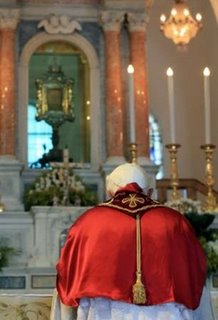
Simple (1955 Calendar): September 1
St. Giles is said to have been born in Athens, Greece, and as a youth, he cured a sick beggar by giving him his own cloak. Following the death of his parents, he was frequently showered with the applause of men, which he dreaded. He hated both applause and temporal prosperity. He took a ship and landed in Marseilles, France. After two years of journeying with St. Caesarius at Arles, he made a hermitage in the woods.
During his time of solitude and prayer, he was, according to tradition, nourished by the milk of a hind. The hind took refuge in the cave of St. Giles. The hounds of Favius, king of the Goths, were hunting the hind. On the third day, Favius and the bishop approached the area, and Favius fired an arrow into the bushes. The arrow wounded St. Giles. When the two men found the wounded St. Giles with the hind with him, they ordered him to account for himself. After St. Giles told his story, Favius and the bishop asked for his forgiveness and offered him medical help and gifts. St. Giles refused all gifts.
King Flavius continued to visit St. Giles, who eventually asked the King to found a monastery. The King agreed but only if St. Giles would serve as the abbot. The monastery was built near the cave where St. Giles lived. Soon Charles, the King of France, heard of St. Giles. They talked on spiritual matters, but the King Charles was too ashamed to admit one particular sin to the saint during their discourse.
"On the following Sunday, when the holy man was celebrating Mass according to custom and praying to God for the king during the canon, an angel of the Lord appeared to him and laid on the altar a scroll on which was written the sin which the king had committed, and which further said that he would be forgiven at Giles's intercession, provided he did penance and desisted from that sin in the future...When Mass was ended Giles gave the scroll to the king to read, who fell at the saint's feet, begging him to intercede with the Lord for him. And so the man of the Lord commended him to God in prayer and gently admonished him to refrain from that sin in the future."St. Giles returned to his monastery and then, soon afterward, went to Rome to commend his monks to the Holy See. The pope granted them many privileges and gave him a present - two carved doors of cedar. St. Giles threw the doors in the Tiber River trusting in God's guidance, that they would arrive in France before him. And, behold, they did just that.
After being warned in a dream, St. Giles died on Sunday, September 1 in c. 710 AD. He is remembered on September 1st every year.
Source: Butler's Lives of the Saints (457 - 458)
Dom Gueranger (c. 1880) writes of the impact of his life:
"After the death of the servant of God, the place became more and more frequented. From north and east and south pilgrims poured in, to offer up their prayers and fulfil their vows at the tomb of one, who soon became known as one of the most helpful saints in heaven. Among the crowds came Pontiffs and kings. But the most numerous classes of visitors to the holy relics were soldiers and little children, the former equipped for the crusades, the latter borne in their mothers’ arms; all confiding in the humble, gentle monk who, at the risk of his life, calmed the terror of the poor little hind; all imploring his assistance against the fear which even the bravest may feel in the hour of battle, or the fright that disturbs the little one in his cradle. St. Giles’s ranked as one of the three great pilgrimages of the west; the other two being Rome and Compostello...
"We should never end, were we to enumerate the churches, parishes, abbeys, and altars consecrated to St. Giles, in all parts of Christendom, which are so many sources of grace, and new centres for pilgrimages. Spain, Italy, Belgium, Germany, Hungary, Bavaria, Poland, rival France in this respect. England is second to no country in the world; she has one hundred and forty-six sanctuaries dedicated to the pious monk, and even the established church continues to honour him."
Prayer:
May the intercession of blessed Giles the Abbot commend us unto Thee, we beseech Thee, O Lord: so that what we cannot acquire by any merits of ours, we may obtain by his patronage. Through our Lord.
Prayer Source: 1962 Roman Catholic Daily Missal
May the intercession of blessed Giles the Abbot commend us unto Thee, we beseech Thee, O Lord: so that what we cannot acquire by any merits of ours, we may obtain by his patronage. Through our Lord.
Prayer Source: 1962 Roman Catholic Daily Missal

















